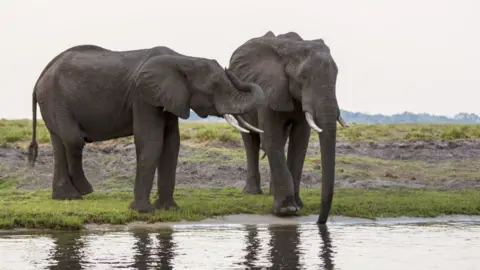By Jacqueline Howard, BBC News,
Edited by Amal Udawatta
 Getty Images
Getty ImagesThe president of Botswana has threatened to send 20,000 elephants to Germany in a political dispute.
Earlier this year, Germany's environment ministry suggested there should be stricter limits on importing hunting trophies.
Botswana's president Mokgweetsi Masisi told German media this would only impoverish people in his country.
He said elephant numbers had exploded as a result of conservation efforts, and hunting helped keep them in check.
Germans should "live together with the animals, in the way you are trying to tell us to", Mr Masisi told German newspaper Bild.
Botswana is home to about a third of the world's elephant population - more than 130,000 - more than it has space for.
Herds were causing damage to property, eating crops and trampling residents, he told Bild.
Botswana has previously given 8,000 elephants to neighbouring Angola, and has offered hundreds more to Mozambique, as a means of bringing the population down.
"We would like to offer such a gift to Germany," Mr Masisi said, adding it was not a joke and he would not take no for an answer.
Botswana banned trophy hunting in 2014, but lifted the restrictions in 2019 after facing pressure from local communities.
The country now issues annual hunting quotas, saying that it provides a good source of income for the local community and that the practise is licensed and strictly controlled.
Germany is the EU's largest importer of African elephant trophies, and hunting trophies overall, according to a 2021 report by the Humane Society International.
- 'I'm afraid that elephants will kill me'
- Zimbabwe's dilemma over deadly elephant attacks
- Elephant 'corridors' - where locals take care to cross
- A spokeswoman for the environment ministry in Berlin told the AFP news agency that Botswana had not raised any concerns with Germany on the matter.
The ministry, however, remained in talks with African countries affected by import rules, including Botswana, the spokeswoman said.
Australia, France and Belgium are among countries that have banned the trade in hunting trophies.
In March, UK MPs voted to support a ban on importing hunting trophies, but the legislation has further scrutiny to pass before becoming law.
A pledge to ban the import of hunting trophies was included in the Conservatives' 2019 general election manifesto.
Comments
Post a Comment